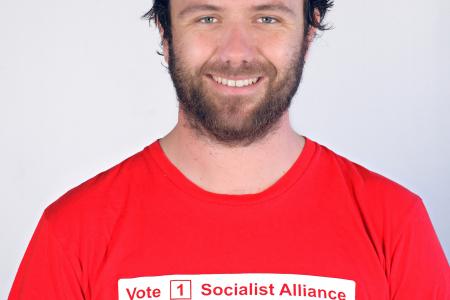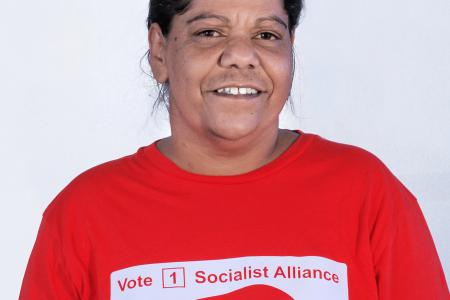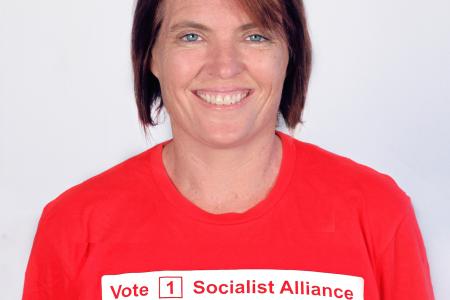One Nation-Liberal deal in WA a sign of desperation

The preference deal announced on February 11 between the Liberals and One Nation, leaving the Nationals furious, is adding to what is expected to be a highly contested state election on March 1 in Western Australia.
The deal has the potential to give One Nation the balance of power in state parliament. It represents further inroads by the far-right party into electoral politics. It also demonstrates the vulnerability of the Liberal Party, which has been in power for the past eight years, and the growing schism between it and its traditional running mates — the National Party.
The WA Liberal government is staring at a significant defeat, amid deteriorating economic forecasts and community opposition to plans to privatise Western Power and the Fremantle Port and the ongoing debacle of the Perth Freight Link freeway project.
Clearly, the Liberal Party’s game makers are worried their declining supporter base will not, by itself, get them over the line.
The Liberals and Nationals have recently been at odds with one another. Their most controversial dispute was over National leader Brendan Grylls’ proposal to raise the mining sector royalty levy to $5 a tonne.
Really, this measure amounts to very little for the mining giants but it differentiates the Nationals from both friends and rivals just weeks from an election. The Liberals and corporate media were quick to chastise Grylls, exacerbating a feud which has only deteriorated further.
Ultimately the question that the Nationals need to answer is whether it wants to represent the smaller farmers in the bush or, like the Liberals, side with big mining and agribusiness interests. If it chooses the latter, it risks becoming politically insignificant and will lose out to One Nation. Choosing the former pits the Nationals firmly against its Coalition partner.
With divisions becoming more pronounced within the Coalition, One Nation is planning to contest 60 seats across WA, and recent opinions polls suggest they could garner 13% of the primary vote.
The far-right racist party has returned to the political scene nationally since the federal election last year where it won four Senate positions. Their return can only be understood in the context of decades of racist “divide and rule” politics of the two major parties and the inability of the Greens to identify with and address the key day-to-day issues facing working people.
One Nation claims to stand for the hard-done-by Aussie battler as an “anti-establishment” alternative to the Liberals. But since being elected to the Senate, it has consistently voted with the federal government to attack workers’ rights and inflict welfare cuts on the most vulnerable.
This new pact will no doubt provoke some heat within the Liberal Party, but the same is already occurring within One Nation. Already, at least one One Nation candidate has said publicly she won’t go along with the preference deal, calling it a sell out.
How effectively One Nation can uphold this contradiction of anti-Liberal rhetoric and complicity with the Liberal’s agenda will be seen in the coming weeks as the contest for votes becomes more intense.
Labor is already gaining political mileage from this preference deal, hoping to draw working class voters who had been straying towards One Nation back into its orbit. Yet Labor is committed to a pro-corporate agenda and is unwilling to seriously address the burning issues facing working people, such as wealth inequality and climate change.
For many people’s entire adult lives, the major parties have peddled racist and xenophobic policies in a race to the bottom over which could demonise refugees the most, while simultaneously cutting wages, conditions and community services.
It should be no surprise then that the actual policy differences between the ALP and One Nation are smaller than the left-sounding rhetoric of Labor might suggest. It is also why so many Labor voters appear to be turning to One Nation. It can garner double digits in opinion polls with relative ease because the path has been paved by the hate and fear politics of both major parties.
The solution to this increasingly dangerous situation is to build the genuine party of the left.
We must unashamedly make the sharpest and loudest condemnation of the entire corrupt system, not just the parties that do its bidding. We must take every opportunity to explain how racism and all other forms of prejudice are actively implanted and nurtured among working people by the billionaire club whose days of privilege will be numbered once the community unites and refuses to be divided any more.
In contrast to the Greens leadership, we cannot talk about politics without referring to capitalism and planning how we can overcome it. The deepening ecological and social crises clearly demonstrate the need for radical change, and building a party and associated movements for this is key.
There is a lot to do.
The Socialist Alliance is running candidates in the South Metro region of Perth in the upcoming state election and we encourage all progressive people to not only vote for us, but get involved with our campaign to help build the power of the community and the message that a better world is possible.
[Chris Jenkins is the Socialist Alliance candidate for the seat of Fremantle in the March WA state election.]


